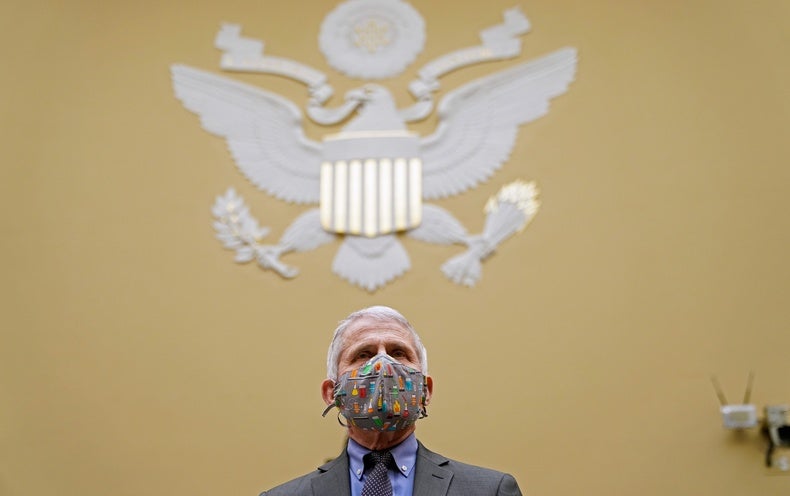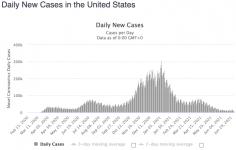You are using an out of date browser. It may not display this or other websites correctly.
You should upgrade or use an alternative browser.
You should upgrade or use an alternative browser.
Covid Vaccine
- Thread starter jitter77
- Start date
- Joined
- Sep 12, 2014
- Messages
- 17,035
- Reaction score
- 6,722
- Points
- 113
West Virginia GOP Governor Jim Justice says “If you’re not vaccinated, you’re part of the problem”
Crosby said he is not guiltyWest Virginia GOP Governor Jim Justice says “If you’re not vaccinated, you’re part of the problem”
West Virginia GOP Governor Jim Justice says “If you’re not vaccinated, you’re part of the problem”
You mean some people aren't vaccinated from the bubonic supersonic plague?



are you going to volunteer your time to go door to door demanding vax records? This is clearly something you are passionate about.West Virginia GOP Governor Jim Justice says “If you’re not vaccinated, you’re part of the problem”

Google News
Comprehensive up-to-date news coverage, aggregated from sources all over the world by Google News.news.google.com
This is clearly false news.
/Floggy
Armbands???? Did you reference ARMBANDS?!?!
Floggy gonna get his panties really twisted now
- Joined
- Apr 8, 2014
- Messages
- 13,800
- Reaction score
- 6,385
- Points
- 113
Be a patriotic American and listen to your President. Thank you President Biden for continuing to shine a light on this, in the hopes of leading red state folks out of the darkness that seems to be all encompassing.
- Joined
- Apr 8, 2014
- Messages
- 18,651
- Reaction score
- 17,939
- Points
- 113
- Location
- Lebanon, OH (Near Kings Island)
Be a patriotic American and listen to your President. Thank you President Biden for continuing to shine a light on this, in the hopes of leading red state folks out of the darkness that seems to be all encompassing.
The new variants are less dangerous than the original. That is how viruses work.
- Joined
- Apr 8, 2014
- Messages
- 13,800
- Reaction score
- 6,385
- Points
- 113
The new variants are less dangerous than the original. That is how viruses work.

How Dangerous Is the Delta Variant, and Will It Cause a COVID Surge in the U.S.?
A new, more transmissible form of SARS-CoV-2 is rapidly spreading in the country and poses a threat to unvaccinated and partially vaccinated people
Studies to date suggest the Delta variant is between 40 and 60 percent more transmissiblethan the Alpha variant first identified in the U.K.—which was already 50 percent more transmissible than the original viral strain first detected in Wuhan, China. Delta has quickly become the dominant variant in the U.K. and has led to another surge in cases there, despite the population’s high vaccination rate. And it is rapidly becoming more prevalent in the U.S. A preprint study, which has not yet been peer-reviewed, found that Delta and another variant called Gamma, first identified in Brazil, are rapidly replacing Alpha, which had previously been the most common U.S. variant. As of June 30, estimates suggest Delta is now the country’s dominant variant, according to William Lee, vice president of science at the genomics company Helix, who co-authored the study.*
“It is the most hypertransmissible, contagious version of the virus we’ve seen to date, for sure—it’s a superspreader strain if there ever was one,” says Eric Topol, a professor of molecular medicine and an executive vice president at the Scripps Research Institution. The U.S. is poorly prepared, he says. Less than half of the nation’s population is fully vaccinated—and that number is much lower in some states, particularly in the South and Mountain West
- Joined
- Sep 12, 2014
- Messages
- 17,035
- Reaction score
- 6,722
- Points
- 113
That’s the ONE kid in Michigan I’ve alluded to numerous times. Where’s the other 1,099 kids that have died?This is clearly false news.
/Floggy

How Dangerous Is the Delta Variant, and Will It Cause a COVID Surge in the U.S.?
A new, more transmissible form of SARS-CoV-2 is rapidly spreading in the country and poses a threat to unvaccinated and partially vaccinated peoplewww.scientificamerican.com
Studies to date suggest the Delta variant is between 40 and 60 percent more transmissiblethan the Alpha variant first identified in the U.K.—which was already 50 percent more transmissible than the original viral strain first detected in Wuhan, China. Delta has quickly become the dominant variant in the U.K. and has led to another surge in cases there, despite the population’s high vaccination rate. And it is rapidly becoming more prevalent in the U.S. A preprint study, which has not yet been peer-reviewed, found that Delta and another variant called Gamma, first identified in Brazil, are rapidly replacing Alpha, which had previously been the most common U.S. variant. As of June 30, estimates suggest Delta is now the country’s dominant variant, according to William Lee, vice president of science at the genomics company Helix, who co-authored the study.*
“It is the most hypertransmissible, contagious version of the virus we’ve seen to date, for sure—it’s a superspreader strain if there ever was one,” says Eric Topol, a professor of molecular medicine and an executive vice president at the Scripps Research Institution. The U.S. is poorly prepared, he says. Less than half of the nation’s population is fully vaccinated—and that number is much lower in some states, particularly in the South and Mountain West
It manifests itself like hayfever.
HAYFEVER...per British scientists.
Remember CNN when.....last September....
Funny how quickly these organizations spin on a dime and their lemmings follow along immediately.
Look at what they wrote below, and look at the cases she offers up. Especially the President Ford swine flu case. Sound eerily familiar to where we are now?

(CNN) Vaccine experts are warning the federal government against rushing out a coronavirus vaccine before testing has shown it's both safe and effective. Decades of history show why they're right.
More than 200,000 children got the polio vaccine, but within days the government had to abandon the program.
"Forty thousand kids got polio. Some had low levels, a couple hundred were left with paralysis, and about 10 died," said Dr. Howard Markel, a pediatrician, distinguished professor, and director of the Center for the History of Medicine at the University of Michigan. The government suspended the vaccination program until it could determine what went wrong.
"President Ford was basically told by his advisers, that look, we have a pandemic flu coming called swine flu that may be as bad as Spanish flu," said Michael Kinch, a professor of radiation oncology in the school of medicine at Washington University in St. Louis. His latest book, "Between Hope and Fear," explores the history of vaccines.
"Ford was being cajoled to put forward a vaccine that was hastily put together. When you have a brand new strain situation like that, they had to do it on the fly," Kinch said.
Ford made the decision to make the immunization compulsory.
The government launched the program in about seven months and 40 million people got vaccinated against swine flu, according to the CDC. That vaccination campaign was later linked to cases of a neurological disorder called Guillain-Barre syndrome, which can develop after an infection or, rarely, after vaccination with a live vaccine.
"Unfortunately, due to that vaccine, and the fact that it was done so hastily, there were a few hundred cases of Guillain-Barre, although it's not definitive that they were linked," Kinch said.
The CDC said the increased risk was about 1 additional case of Gullain-Barre for every 100,000 people who got the swine flu vaccine. Due to this small association, the government stopped the program to investigate.
"It was kind of a fiasco," Markel said. "The good news is that there never was an epidemic of swine flu. So we were safe, but that shows you what could happen."
Funny how quickly these organizations spin on a dime and their lemmings follow along immediately.
Look at what they wrote below, and look at the cases she offers up. Especially the President Ford swine flu case. Sound eerily familiar to where we are now?

(CNN) Vaccine experts are warning the federal government against rushing out a coronavirus vaccine before testing has shown it's both safe and effective. Decades of history show why they're right.
The Cutter incident
On April 12, 1955 the government announced the first vaccine to protect kids against polio. Within days, labs had made thousands of lots of the vaccine. Batches made by one company, Cutter Labs, accidentally contained live polio virus and it caused an outbreak.More than 200,000 children got the polio vaccine, but within days the government had to abandon the program.
"Forty thousand kids got polio. Some had low levels, a couple hundred were left with paralysis, and about 10 died," said Dr. Howard Markel, a pediatrician, distinguished professor, and director of the Center for the History of Medicine at the University of Michigan. The government suspended the vaccination program until it could determine what went wrong.
The epidemic that never was
In 1976, scientists predicted a pandemic of a new strain of influenza called swine flu. More than 40 years later, some historians call it "flu epidemic that never was.""President Ford was basically told by his advisers, that look, we have a pandemic flu coming called swine flu that may be as bad as Spanish flu," said Michael Kinch, a professor of radiation oncology in the school of medicine at Washington University in St. Louis. His latest book, "Between Hope and Fear," explores the history of vaccines.
"Ford was being cajoled to put forward a vaccine that was hastily put together. When you have a brand new strain situation like that, they had to do it on the fly," Kinch said.
Ford made the decision to make the immunization compulsory.
The government launched the program in about seven months and 40 million people got vaccinated against swine flu, according to the CDC. That vaccination campaign was later linked to cases of a neurological disorder called Guillain-Barre syndrome, which can develop after an infection or, rarely, after vaccination with a live vaccine.
"Unfortunately, due to that vaccine, and the fact that it was done so hastily, there were a few hundred cases of Guillain-Barre, although it's not definitive that they were linked," Kinch said.
The CDC said the increased risk was about 1 additional case of Gullain-Barre for every 100,000 people who got the swine flu vaccine. Due to this small association, the government stopped the program to investigate.
"It was kind of a fiasco," Markel said. "The good news is that there never was an epidemic of swine flu. So we were safe, but that shows you what could happen."
That’s the ONE kid in Michigan I’ve alluded to numerous times. Where’s the other 1,099 kids that have died?
Wait...so yer buying this news AND actually read an article?
- Joined
- Apr 9, 2014
- Messages
- 5,020
- Reaction score
- 10,508
- Points
- 113
"okay...but what about the other 1,098 kids?" ~ Trog
- Joined
- Apr 8, 2014
- Messages
- 18,651
- Reaction score
- 17,939
- Points
- 113
- Location
- Lebanon, OH (Near Kings Island)
It is still less dangerous when contracted than the previous strain. Period. Transmission doesn’t equate to deadliness. All viruses mutate and become more transmissible but weaker. More people get it but have leas reaction while gaining immunity to it and eventually it burns itself out becoming nothing more than another version of the common cold. Stop fear mongering.
How Dangerous Is the Delta Variant, and Will It Cause a COVID Surge in the U.S.?
A new, more transmissible form of SARS-CoV-2 is rapidly spreading in the country and poses a threat to unvaccinated and partially vaccinated peoplewww.scientificamerican.com
Studies to date suggest the Delta variant is between 40 and 60 percent more transmissiblethan the Alpha variant first identified in the U.K.—which was already 50 percent more transmissible than the original viral strain first detected in Wuhan, China. Delta has quickly become the dominant variant in the U.K. and has led to another surge in cases there, despite the population’s high vaccination rate. And it is rapidly becoming more prevalent in the U.S. A preprint study, which has not yet been peer-reviewed, found that Delta and another variant called Gamma, first identified in Brazil, are rapidly replacing Alpha, which had previously been the most common U.S. variant. As of June 30, estimates suggest Delta is now the country’s dominant variant, according to William Lee, vice president of science at the genomics company Helix, who co-authored the study.*
“It is the most hypertransmissible, contagious version of the virus we’ve seen to date, for sure—it’s a superspreader strain if there ever was one,” says Eric Topol, a professor of molecular medicine and an executive vice president at the Scripps Research Institution. The U.S. is poorly prepared, he says. Less than half of the nation’s population is fully vaccinated—and that number is much lower in some states, particularly in the South and Mountain West
- Joined
- Apr 9, 2014
- Messages
- 19,959
- Reaction score
- 33,683
- Points
- 113
- Location
- $62.75 would help feed Paxton
Do fingering a staffer and relentlessly gobbling ice cream prevent the Chinese flu? Asking because Tiborat seems to think so.
- Joined
- Apr 9, 2014
- Messages
- 5,020
- Reaction score
- 10,508
- Points
- 113
Now you got Tibs fantasizing about being a staffer. Tibs likey ice cream.Do fingering a staffer and relentlessly gobbling ice cream prevent the Chinese flu?
- Joined
- Sep 12, 2014
- Messages
- 17,035
- Reaction score
- 6,722
- Points
- 113
“Let’s say” it’s actual news and not some nonsensical extrapolation motivated by ideological conviction.Wait...so yer buying this news AND actually read an article?

Is that similar to the labia version I hear on CNN
“Let’s say” it’s actual news and not some nonsensical extrapolation motivated by ideological conviction
Ideology is hanging on so hard to COVID and lockdowns out of love, that in spite of DATA, EVIDENCE, you make claims like COVID cases are on the rise (see the COVID thread, your claim).
We had 6K new cases yesterday. Can you read a graph? I'm curious. Can you point to cases rising?
That son is an ideologue. You.
We know you are hoping they rise...which makes you a sick, twisted ****.

Gotta keep the fear at a fever pitch.
My 14 yo got his first Pfizer two weeks ago. He has a swollen lymph node. That is enough. He aint getting the second. We are all vaxxed. He doesn't need to be fully.
My 14 yo got his first Pfizer two weeks ago. He has a swollen lymph node. That is enough. He aint getting the second. We are all vaxxed. He doesn't need to be fully.


